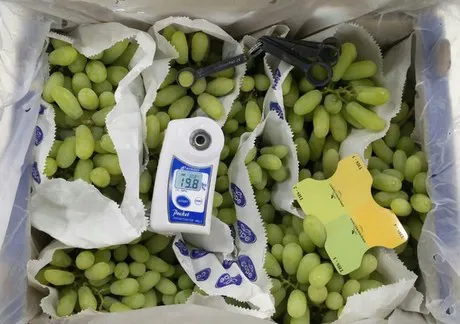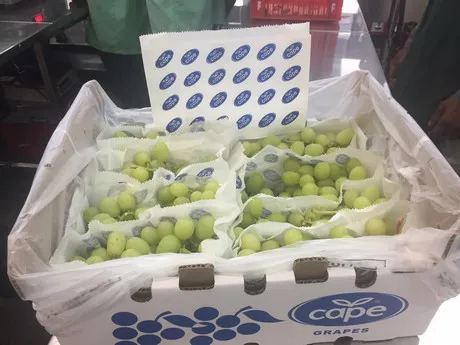“For Europe, South Africa is by far the most dominant region for seedless grapes. Between October and the end of December, the relative volumes of seedless grapes are: Peru 33%, South Africa 28%, Namibia 20% and Brazil 18%,” explains Geoff Green of Capespan.
“This changes in weeks 1 and 2. In those weeks 82% of the shipments of seedless grapes to Europe and the United Kingdom come from South Africa. Then comes Peru with a share of 10%. The rest is divided between Namibia, India and Brazil. Argentina also exports during this period, but only small volumes. ”

Between weeks 35 and 53, the estimated volume of grapes shipped to continental Europe was 117,000 tonnes, excluding volumes destined for the Russian market. On top of that, the volumes for the United Kingdom were 53,000 tonnes. The total volumes for Europe amount to 170,000 tonnes of grapes in that period. “We are now entering the most important period of the year for imported grapes, the period between January and May. Until the end of February, we expect a volume of 17,000 tonnes of seedless grapes for all of Europe. 11,600 tonnes per week for the mainland and 5,400 tonnes for the UK,” says Geoff. "These volumes are based on last year's volumes."
“March and April are the months with the highest expected volumes of imported seedless grapes. In those months, we expect an average of 23,000 tonnes per week, 16,000 tonnes for the European mainland and 6,900 tonnes for the United Kingdom. That means slightly less than 23,000 tonnes per week in those two months,” says Geoff. “Looking at this year, we are slightly ahead of 2020, but at the same level as 2019. There have also been delays with ships from Namibia and South Africa, causing some shortages in the market.”
COVID-19
“Covid-19 has had limited impact on the grape market so far. The import figures show that India was forced to stop exports last year due to Covid measures. However, the supply to Europe has only increased. We see that growers have better yields so far in Namibia and the early areas in South Africa, so that determines sales and sales. Most markets are currently showing very stable and normal sales of grapes. Grapes are one of the largest categories in terms of consumer spending,” notes Geoff.

Delays
There is a lot of competition in the grape market, but the delays have resulted in unplanned shortages. “The October to November period is more competitive as Brazil and Peru have to wait for their opportunities due to the improvement of the late EU varieties that can be harvested later and can be stored for longer,” says Geoff. Even countries that previously had little access to new varieties are now participating in the planting of new varieties. “These are mainly Egypt, India and Chile. Those countries started slowly in terms of new varieties, but they have caught up quite a bit recently. ”
Worldwide
“If we look at the global grape statistics, we see that China is by far the largest producer with about 43% of the global production, which amounts to 23 million tonnes per year. Turkey and India are also very large producers, but in these countries too most of the fruit is sold or processed locally. The total Chinese production is 10 times the Chilean production, while Chile is originally the largest exporter of grapes. About 3.7 million tonnes of good quality grapes are exported worldwide on an annual basis, but that number has been fairly stable for years,” Green concludes.
Voor meer informatie:
Geoff Green
Ben Taieb
Capespan 
Borsbeeksebrug 34/1
2600 Antwerpen
Ben.Taieb@capespan.eu
+32486400365 ( whatsapp)
Geoff.Green@Capespan.co.uk
+447802816533 (whatsapp)
www.capespan.com
